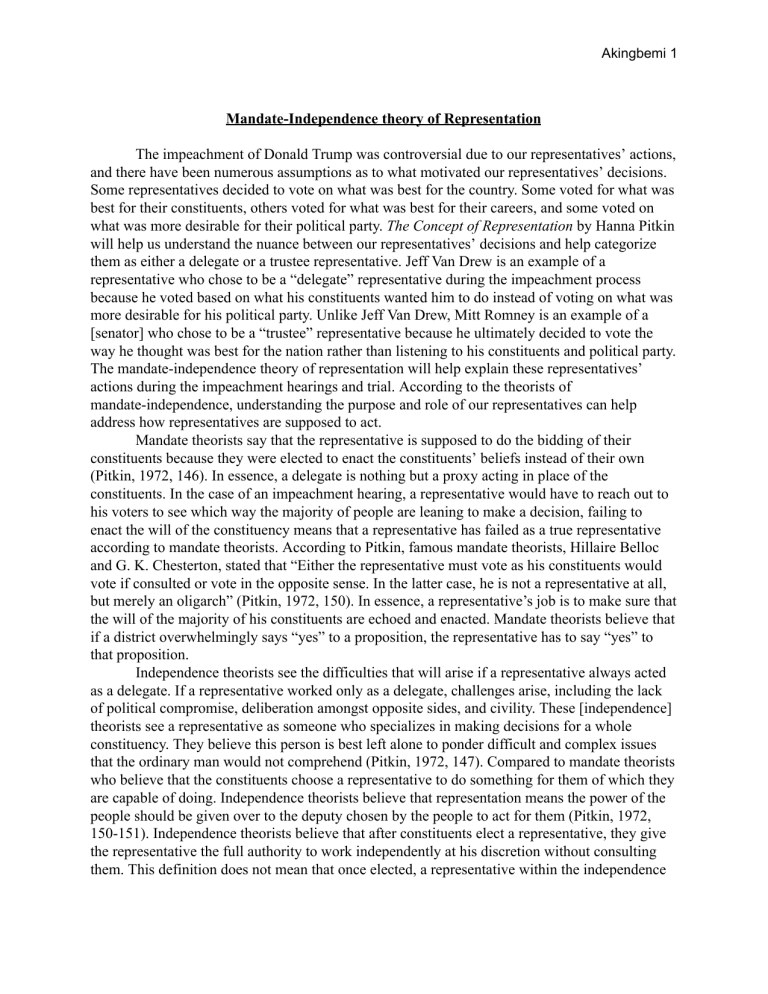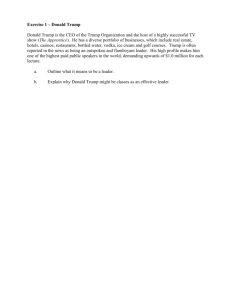
Akingbemi 1 Mandate-Independence theory of Representation The impeachment of Donald Trump was controversial due to our representatives’ actions, and there have been numerous assumptions as to what motivated our representatives’ decisions. Some representatives decided to vote on what was best for the country. Some voted for what was best for their constituents, others voted for what was best for their careers, and some voted on what was more desirable for their political party. The Concept of Representation by Hanna Pitkin will help us understand the nuance between our representatives’ decisions and help categorize them as either a delegate or a trustee representative. Jeff Van Drew is an example of a representative who chose to be a “delegate” representative during the impeachment process because he voted based on what his constituents wanted him to do instead of voting on what was more desirable for his political party. Unlike Jeff Van Drew, Mitt Romney is an example of a [senator] who chose to be a “trustee” representative because he ultimately decided to vote the way he thought was best for the nation rather than listening to his constituents and political party. The mandate-independence theory of representation will help explain these representatives’ actions during the impeachment hearings and trial. According to the theorists of mandate-independence, understanding the purpose and role of our representatives can help address how representatives are supposed to act. Mandate theorists say that the representative is supposed to do the bidding of their constituents because they were elected to enact the constituents’ beliefs instead of their own (Pitkin, 1972, 146). In essence, a delegate is nothing but a proxy acting in place of the constituents. In the case of an impeachment hearing, a representative would have to reach out to his voters to see which way the majority of people are leaning to make a decision, failing to enact the will of the constituency means that a representative has failed as a true representative according to mandate theorists. According to Pitkin, famous mandate theorists, Hillaire Belloc and G. K. Chesterton, stated that “Either the representative must vote as his constituents would vote if consulted or vote in the opposite sense. In the latter case, he is not a representative at all, but merely an oligarch” (Pitkin, 1972, 150). In essence, a representative’s job is to make sure that the will of the majority of his constituents are echoed and enacted. Mandate theorists believe that if a district overwhelmingly says “yes” to a proposition, the representative has to say “yes” to that proposition. Independence theorists see the difficulties that will arise if a representative always acted as a delegate. If a representative worked only as a delegate, challenges arise, including the lack of political compromise, deliberation amongst opposite sides, and civility. These [independence] theorists see a representative as someone who specializes in making decisions for a whole constituency. They believe this person is best left alone to ponder difficult and complex issues that the ordinary man would not comprehend (Pitkin, 1972, 147). Compared to mandate theorists who believe that the constituents choose a representative to do something for them of which they are capable of doing. Independence theorists believe that representation means the power of the people should be given over to the deputy chosen by the people to act for them (Pitkin, 1972, 150-151). Independence theorists believe that after constituents elect a representative, they give the representative the full authority to work independently at his discretion without consulting them. This definition does not mean that once elected, a representative within the independence Akingbemi 2 theory does not have to consult his constituents; however, it means that a representative within this theory makes the final decision and has the right not to consult his constituents. Jeff Van Drew, previously a Democrat, is a representative from New Jersey’s 2nd congressional district, and his impeachment vote is a crucial case study for someone acting as a delegate. It is important to note that in 2018, Van Drew ran as a Democrat and won the seat. However, before his election, in 2016, Trump took the district after former President Barack Obama won it in both 2008 and 2012 (Przybyla and Li 2019). This information proves that many Van Drew’s constituents are moderate to conservative-liberals that flip-flop between both political parties in election cycles. The house’s impeachment hearings saw numerous representatives vote along party lines, but this was not the case for representative Van Drew. According to a YouGov poll, 90 percent of American Democratic party voters approved of the House of Representatives decision to impeach President Trump in the first place compared to 7 percent of American Republican party voters (Bycoffe, Koeze and Rakich 2020). As a member of the Democratic party, Jeff Van Drew was expected to vote “YES” on both articles of impeachment as did almost all Democratic party officials. However, he decided to go against the will of the party. Democratic Party voters mostly elected Van Drew, so it can be assumed that his constituents felt the same as did most Democratic voters about Trump’s impeachment. Some might say that Van Drew was more of a trustee representative for going against the mostly Democratic constituents that elected him. Still, he acted as a delegate by understanding that the previous electorate that elected him was diminishing. Consequently, it can be assumed that even though Van Drew knew that Democrats elected him, he felt the tide turning within his district politically, which prompted him to vote according to the will of the people. Drew acted as a delegate to please his now mostly Republican constituency. Drew’s “NO” vote on the articles of impeachment prompted support from Republicans within his district. These events led to Drew switching political parties and meeting with President Trump, which was essentially an endorsement. Mitt Romney is a Republican member of the Senate from the state of Utah. He ran for the Senate seat in 2018 and won the election with 63 percent of the vote. Before the impeachment hearings making it to trial in the Senate, according to an IPSOS poll, 54 percent of the American public approved of the Senate voting to remove President Trump from office; however, 10 percent of Republicans according to polls supported the Senate removing Trump (Bycoffe, Koeze and Rakich 2020). Due to the overwhelming Republican support base in Utah, most people expected Romney to vote “No” on convicting Trump in the Senate trials. Nevertheless, Romney decided to go against the will of his political party and his constituents. Romney acted as an independent arbiter void from any instructions from his constituents. Romney attributed his decision to read the Federalist Papers as the determinant factor that guided him to vote “Yes” to find Trump guilty of abuse of power. The Federalist Papers is a complicated document that most of Romney’s constituents and Americans have not read. Romney’s interpretation of this historic document informed his decision to find Trump guilty of abuse of power. Romney admits that the outcome could have been different if the voters chose the fate of Trump. However, he vehemently rejected the idea of voters determining Trump’s fate at the ballot box; still, he said that it was right for the Senate to decide the outcome of Impeachment because his conscience was at peace with his decision (Coppins 2020). Romney knew his decision to go against the Republican party and his constituents would make his political life harder. Still, he believed it was his job to make that decision as a representative. Romney truly believes that sometimes it is Akingbemi 3 okay to deviate from his constituents’ will for the overall national interest. In this instance, he thought that Trump violated his oath to the office of the Presidency, so he chose to listen to his conscience instead of his extremely conservative constituency. These representatives had a lot to consider in making their decision, Senator Mitt Romney’s and representative Jeff Van Drew’s decision on whether or not to vote “Yes” or “No” on the impeachment of President Donald J. Trump was not an easy choice to make. They both represent a diverse group of people whose opinions and perspectives differed on impeaching and removing President Trump from office; it was up to these representatives whether they wanted to enact the will of the people or whether they wanted to act independently. Jeff Van Drew chose to adopt his constituents’ will and switch political parties in possibly a desperate hope to win his next congressional election. Senator Romney decided to act independently from his constituents’ will. He justified his decision by providing an artifact from the Federalist Papers that condemned President Trump’s actions. Based on these representatives’ actions in the impeachment hearings and trial, we see the difference between the mandate and independent theories and the vital role they play in American representative society. Bibliography 1. Pitkin, Hanna Fenichel. 1972. The Concept of Representation. Berkeley: University of California. 2. Przybyla, Heidi, and David K. Li. 2019. "Rep. Jeff Van Drew, Opposed To Impeachment, Expected To Leave Democratic Party." NBC News. https://www.nbcnews.com/politics/congress/new-jersey-rep-jeff-van-drew-opposed-impe achment-expected-leave-n1102316 (28 May 2020). 3. Costa, Robert. 2019. "Trump Welcomes Rep. Van Drew, An Impeachment Foe Switching Parties To Join GOP." https://www.washingtonpost.com/politics/trump-welcomes-rep-van-drew-an-impeachme nt-foe-to-the-gop/2019/12/19/76bccad2-226c-11ea-a153-dce4b94e4249_story.html (28 May 2020). 4. Bycoffe, Aaron, Ella Koeze, and Nathaniel Rakich. 2020. "Do Americans Support Impeaching Trump?." FiveThirtyEight. https://projects.fivethirtyeight.com/impeachment-polls/ (28 May 2020). 5. Coppins, McKay. 2020. "How Mitt Romney Decided Trump Is Guilty." The Atlantic. https://www.theatlantic.com/politics/archive/2020/02/romney-impeach-trump/606127/ (28 May 2020).


